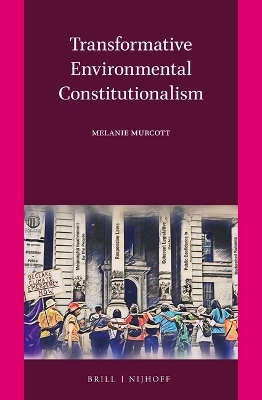
Transformative Environmental Constitutionalism
Martinus Nijhoff (Verlag)
978-90-04-50939-9 (ISBN)
Given the Anthropocene's converging socio-ecological crises, particularly the dire issue of climate change, social movements are increasingly approaching the courts to advance intersecting struggles for social, environmental, and climate justice. Transformative constitutional regimes in South Africa and elsewhere that incorporate environmental and human rights protections offer potentially powerful legal norms to advance the struggles of these movements. Grappling with such norms and with problematic trends in adjudication, Prof. Melanie Jean Murcott develops a legal theory of Transformative Environmental Constitutionalism as a novel framework within which courts could adjudicate environmental law disputes, developing law for the Anthropocene’s global struggles.
Melanie Jean Murcott, LLD (2020), North-West University, is an Associate Professor of Environmental Law and Administrative Law at the University of Pretoria. She publishes extensively in these fields, including on "Emerging climate law and governance measures in South Africa".
Preface Developing Law for the Anthropcene in the Global South
Abbreviations
1 It’s Time to Get Crazy Justifying Radical Judicial Responses to Intersecting Social, Environmental and Climate Injustices
1.1 Introduction
1.2 An Environmental Law Dispute
1.3 A Socio-ecological Systems Perspective for the Anthropocene
1.4 A Global South Context and Justification for Radical Judicial Responses for the Anthropocene: Patterns of Marginalisation, Disadvantage, and Vulnerability in South Africa and Conceptualising (In)Justice
1.4.1 Poverty and Inequality in South Africa
1.4.2 Social, Environmental, and Climate (In)Justice
1.5 Methodology and Structure of the Book
1.5.1 Progressive and Reformist Legal Scholarship
1.5.2 A Legal Theory Emerging from a Tapestry of Norms, Woven Together
1.5.3 Justifying a Legal Theory of Transformative Environmental Constitutionalism by Grappling with Problematic Trends in the Adjudication of Environmental Law Disputes
1.5.4 Transformative Environmental Constitutionalism in Theory and Practice
1.5.5 Conclusion: The Importance of a Legal Theory of Transformative Environmental Constitutionalism
2 Weaving Together a Tapestry of Norms Transformative Constitutionalism, Transformative Adjudication, and Environmental Constitutionalism
2.1 Introduction
2.2 Transformative Constitutionalism
2.2.1 Support for Transformative Constitutionalism Elsewhere in the World
2.2.2 Criticisms of Transformative Constitutionalism
2.2.3 Transformative Constitutionalism’s Goals: A Critical Perspective
2.3 Transformative Adjudication
2.3.1 The Political Nature of Transformative Adjudication through Substantive Reasoning
2.3.2 The Need to Overcome Formalism
2.3.3 Transformative Adjudication and the Separation of Powers Doctrine
2.4 Environmental Constitutionalism in South Africa
2.4.1 Category 1: Laws Explicitly Aimed at the Protection of the Environment and/or Components
2.4.2 Category 2: Laws Requiring Transparent, Lawful, Participatory, Fair, and Reasonable Decision Making
2.4.3 Category 3: Substantive Rights Interrelated with and Mutually Reinforcing of Environmental Protection
2.5 Conclusion
3 Problematic Trends in the Adjudication of Environmental Law Disputes in South Africa
3.1 Introduction
3.2 Overlooking Social, Environmental, and Climate Injustices in Environmental Law Disputes (the “Overlooking Trend”)
3.2.1 Adendorffs Boerderye
3.2.2 Kenton on Sea
3.3 Over-Proceduralising Environmental Law Disputes (the “Over-Proceduralisation Trend”)
3.3.1 Normandien Farms
3.3.2 The Barberton Mines Judgments
3.4 Under-Development of the Environmental Right (the “Under-Utilisation Trend”)
3.4.1 Under-Development by Virtue of Courts Paying Lip Service to the Environmental Right
3.4.1.1 Propshaft
3.4.1.2 iSimangaliso
3.4.2 Under-Development by Virtue of Courts Presuming that Substantive Provisions in Environmental Legislation Give Effect to the Environmental Right
3.5 Overlooking the Relationships among Environmental Rights and other Interrelated and Mutually Reinforcing Rights (the “Compartmentalisation Trend”)
3.6 Conclusion
4 Developing Law for the Anthropocene Exploring the Content of a Legal Theory of Transformative Environmental Constitutionalism
4.1 Introduction
4.2 Justice-Oriented Framing of Disputes
4.3 Substantive, Rights-Based Adjudication
4.3.1 Substantive Engagement with Justice-Oriented Provisions in Environmental Legislation
4.3.2 Environmental Justice
4.3.3 Public Trusteeship
4.3.4 Developing the Normative Content of the Environmental Right
4.3.5 Ecological Sustainability
4.3.6 Inter- and Intra-generational Equity
4.3.7 Recognising the Mutually Reinforcing and Interrelated Nature of the Environmental Right and Other Substantive Rights
4.3.8 The rights to Life and Dignity
4.3.9 Socio-economic Rights
4.3.10 Cultural Rights
4.4 Conclusion
5 The Practical Significance of Transformative Environmental Constitutionalism Offering Hope for the Adjudication of Future Environmental Law Disputes
5.1 Introduction
5.2 Earthlife
5.2.1 The Framing of the Dispute in Earthlife
5.2.2 Purposive and Substantive Rights-Based Adjudication in Earthlife
5.3 veja
5.3.1 The Framing of the Dispute in veja
5.3.2 Purposive and Substantive Rights-Based Adjudication in veja
5.4 The Gongqose Judgments
5.4.1 Framing of the Dispute in the Gongqose Judgments
5.4.2 Purposive and Substantive Rights-Based Adjudication in the Gongqose Judgments
5.5 Conclusion
6 Conclusion
6.1 Transformative Environmental Constitutionalism as Work-in-Progress
6.2 Law for the Anthropocene: A Moving Target
Bibliography
Index
| Erscheinungsdatum | 10.10.2022 |
|---|---|
| Sprache | englisch |
| Maße | 155 x 235 mm |
| Gewicht | 577 g |
| Themenwelt | Recht / Steuern ► EU / Internationales Recht |
| Recht / Steuern ► Öffentliches Recht ► Völkerrecht | |
| ISBN-10 | 90-04-50939-9 / 9004509399 |
| ISBN-13 | 978-90-04-50939-9 / 9789004509399 |
| Zustand | Neuware |
| Haben Sie eine Frage zum Produkt? |
aus dem Bereich


